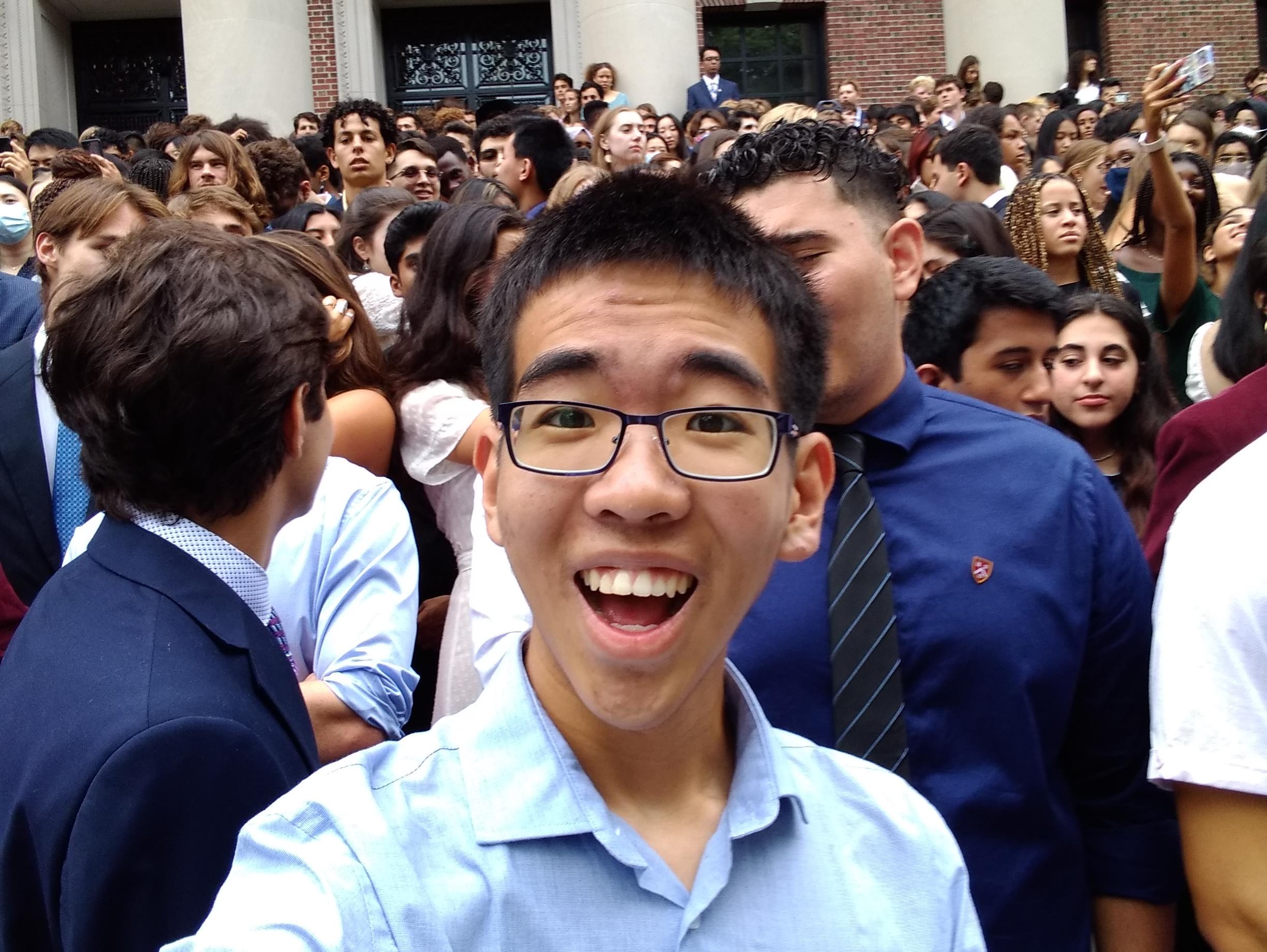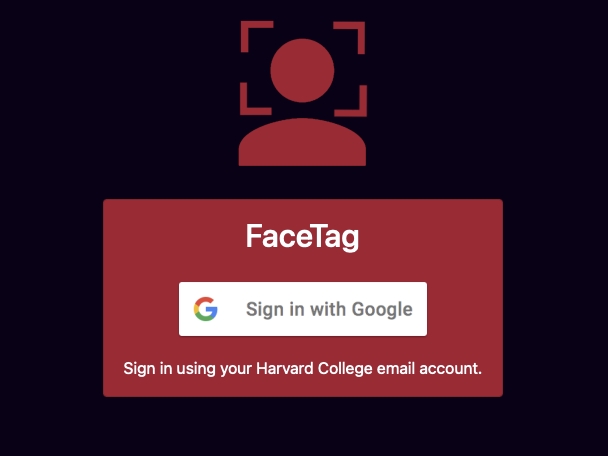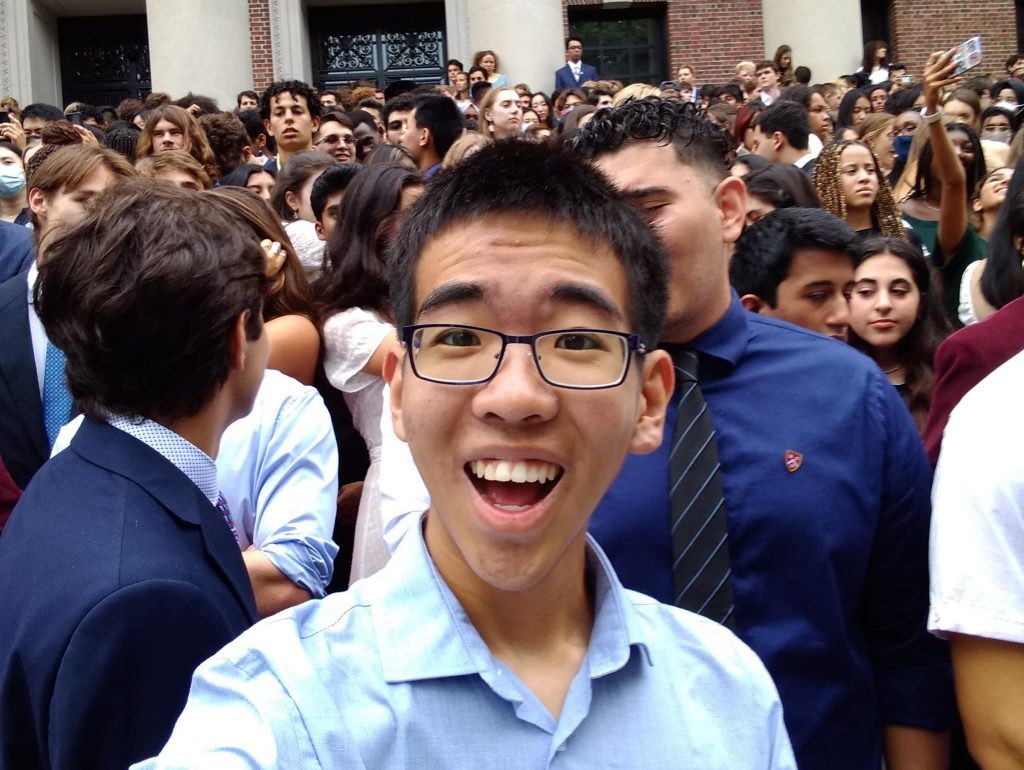
Yuen Ler Chow
- The FaceTag lets users sign up, scan the face of another user, and exchange contact information.
- The app is only available to Harvard students, echoing Zuckerberg's initial creation, TheFacebook.
- TikTok videos Chow made about The FaceTag collectively have almost a million views.
Harvard freshman Yuen Ler Chow created an app in his dorm room that lets students sign up, scan the face of another user, and exchange contact information like phone numbers and Instagram handles. Right now, it's only available at Harvard. Chow calls it, "The FaceTag."
In a comment under a TikTok video he made about the app, Chow said he only named it The FaceTag because FaceTag.com was taken. But he told Insider over the phone that he knew what he was doing (by alluding to Harvard alumnus Mark Zuckerberg who initially called his creation TheFacebook).
"Obviously this app isn't related to Facebook at all," he said. "But the fact that I am a Harvard undergrad and I'm making kinda like a social media app, having the name FaceTag was funny, and having it be The FaceTag was kinda funny as well."
The FaceTag has just more than 100 sign ups, according to Chow, and it's only available via web browser at TheFaceTag.com. But a series of TikToks he made about it collectively has almost a million views. Most of the comments strike a similar tone: the app is unethical, and he shouldn't have made it.
"What's up with Harvard kids and not understanding ethics?" one TikToker wrote.
"What a wonderful idea from a young Harvard student, surely this won't be a threat to democracy within a decade," another said. ("Can't tell if you're joking," Chow responded.)
"Dude don't you think if there was an ethical way to do this there would already be several iterations of it?" popular TikToker Serena Shahidi, also known as @glamdemon2004, commented.

The FaceTag/Insider
There are lots of apps for exchanging contact information, but they aren't super popular, and unlike The FaceTag, they don't use facial recognition. Chow said these commenters don't understand the app, which he made using an open source facial recognition API.
When a person first makes a FaceTag profile, the app scans their face and extracts points and measurements. That information is saved, Chow said, but not the image itself. If you scan the face of someone who hasn't signed up for The FaceTag, it won't work. But if they are signed up, too, the app will make a match.
People can enter their phone number, Instagram, and Snapchat account details into The FaceTag. And it's all or nothing: You can't decide to share different information with different people. If someone has a private profile, they have to hit "accept" before others can get their contact information. On a non-private profile, contact information is shared right after the app makes a face match.
The debate about The FaceTag reflects growing concerns surrounding facial recognition. Many of the TikTok comments pose "what-ifs" that are common fears for women, especially. What if someone scans your face and gets your information without your consent? (This could be avoided by not signing up, or making your profile private.) What if you're coerced into sharing your information on The FaceTag? (Like real life, this can't be completely avoided, but you can remove someone as a FaceTag "friend" if you want to.)
The biggest risk, arguably, is if someone hacked The FaceTag and harvested users' friends, contact information, and facial measurements.
"A reason many people have so many misconceptions about the app is because I didn't really explain it in the video," Chow wrote in an email. "This was deliberate, because I knew that a shorter, more concise video would go viral rather than, say, a whole minute video explaining my app. It worked - I got like a million views total, but... now idk if the hate was worth it lol."
The FaceTag may not have sparked controversy if it generated QR codes rather than using a face-scanner. But Chow told Insider he wanted to use facial recognition because it's "just so much more cool" than QR codes, and he wanted to play around with open source machine learning tools.
The debate around The FaceTag is also happening on TikTok, one of the most intrusive apps out there. It uses phone activity trackers (cookies), buys data from third parties, and gathers an immense amount of behavioral information, including "keystroke patterns," and logs of any objects, scenery, and "face and body features" that appear in videos, according to its privacy policy.
Chow is conscious of this irony. "It's kinda weird how I see so many people scared over the fact that I'm collecting this data, but almost all the other social media apps collect way, way more," he said. "It's just that I'm directly telling them that I'm collecting it and they get scared."
Compared to Facebook, The FaceTag is small potatoes to say the least. But among TikTok commenters, there seems to be a sense that they're doing a public service by criticizing the next Mark Zuckerberg before he potentially ruins society.
On the phone with Insider, Chow seemed exhausted by the intense feedback. But he still wants The FaceTag to grow. He said he wants to start "advertising more soon." In TikTok comments, he's also expressed interest in raising money ("How to invest?" someone said, "I'm working on it," Chow responded).
And, of course, expanding it to non-Harvard users. "Turn it into an app outside Harvard then you will be a millionaire," someone said on TikTok. "That's the plan," he responded.
